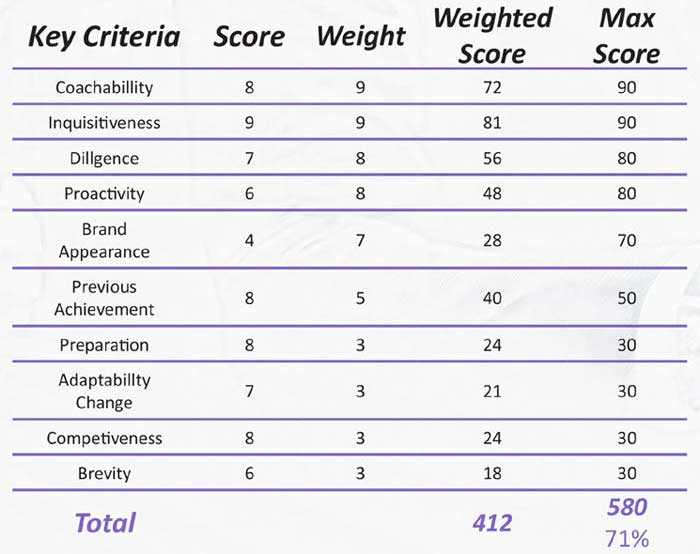
If you’re watching one of your salespeople miss their target month after month, it can make even the best manager feel a bit depressed!
Often this problem is compounded by a sales manager handling the situation poorly. It’s all too easy to opt for having “tough conversations”, in an attempt to push and cajole them to better performance. But this approach is counterproductive, it erodes personal relationships and makes coaching even harder. You can easily end up with increased negativity and even worse performance.
I want to encourage you to deal with this difficult situation in a more positive and productive manner by creating an effective five step coaching plan:
Communicate clearly!
It’s easy to become frustrated with poor performers, especially when you have to listen to their excuses or complaints. But don’t let the situation affect your personal behaviour towards them, either by giving them the cold shoulder or descending into passive-aggressive speech.
Rather, clearly communicate the situation, focus on the lack of performance and the corrective activities you both need to work on to create the right result.
Create a Specific Action Plan.
The corrective action plan needs to be specific and clearly described. An important point to bear in mind is not to not make the goals completely unrealistic. If they are only averaging around 30% of their target, don’t suddenly expect them to hit 100% just because you’re putting a plan into place. Perhaps a 60% goal is more realistic in this situation.
Your goal here is to map out the key steps to be taken and to set the expectation for positive progress. We shouldn’t expect them to bust their target overnight. However, they do need to demonstrate some level of measurable progress in a relatively short time frame.
Make it easy for them to engage with you by creating an ‘Improvement Performance Agreement’ together. This should include the key activities to focus on and three or four activity metrics they agree to complete and sign up to. This ensures you are both on the same page and it demonstrates your personal commitment to see them succeed. Often the root of the problem is their own lack of self-belief, that results in poor performance. Your efforts and belief in them can be a determining factor in turning results around.
As a great coach you can help them identify their skill gaps. Usually, there are only a few aspects of the sales process where they may be falling short. By looking for the specific differences between their approach and the top performers, you can isolate where they need help.
Commit to Regular Follow-ups
Be sure to book regular follow-ups with each other to review your action plan. A weekly check-in for example, to review what they did last week, and to map out what they should do next week is vital. Then they need to make sure they stick to the plan.
In this way, you both know you are holding yourselves accountable to their success. You are also able to constantly keep track of what is working and what isn’t, this can be critical to their eventual success as it allows you to make mid-course corrections if required.
Keep Them Accountable
Poor performance is only a symptom of a deeper problem. It maybe a lack of communication skills, poor organisation, or basic sales skills. But it’s not always these skills that are lacking. It could be desire.
Often, it’s the pure drive to get the job done that separates your top performers from their less successful colleagues.
This internal motivation is almost impossible to inject into someone.
So, you need to hold them accountable, here you’re testing their desire and drive to succeed.
Ask yourself these questions:
- Are they showing a commitment to their action plan?
- Are they demonstrating a coachable attitude and an increased work ethic?
- Are they identifying their strengths and weaknesses and working on improvement?
- Are they achieving better results?
These are all important points to consider as you carefully observe their behaviour compared with your ‘Improvement Performance Agreement’.
If the answer is ‘no’ to any of the above questions, then you need to seriously evaluate if you are dealing with a lack of desire. You may have to look at moving or removing this person from your sales team. It’s not an easy call, but the last thing your business needs is someone who is simply not driven to succeed.
Learn from your mistakes.
This coaching approach has produced excellent results for many of my clients, who have seen their new or under-performing salespeople become consistent top performers.
Even if your coaching program doesn’t produce the desired result all is not lost. Don’t miss out on the valuable opportunity to improve your recruitment and development process.
Here are three steps to quickly improve the quality of your new recruits.
A. Create a list of ideal sales qualities.
What qualities equal sales success at your company?
Write a clear definition for each of these qualities so you can score potential candidates on a scale of 1-10.
B. Work out how to evaluate individuals for each quality.
What questions could you ask to determine their behaviours?
What pre-interview exercises could they complete?
What role-plays or interview scenarios would reveal these qualities?
C. Create a score card for the ideal sales qualities.

After each interview score the candidates out of 10 for each key quality (see the above table). In this way, objective comparisons can be made of the various candidates.
If several members of staff are involved in the hiring process, then comparing scores can be really helpful in delivering additional perspectives. Especially when colleagues’ opinions may be emotive or easily influenced by others, this approach gives some objectivity.
Moving forward, there is real value in collating all this information from the score cards.
In a few months’ time, you will be in an optimal position to review progress. Some salespeople will be producing excellent results, whilst others may be progressing more slowly. However, you can learn from this and refine your selection criteria of key qualities to further improve the process.
You might question the time needed to implement this type of coaching and development. But let me ask you… What’s the alternative? I’d like to make a case that any investment you make in this area delivers far more business results. Compared with the impact of lost sales, costly staff attrition, recruitment fees and the inevitable ramp up time for a new person to achieve target. So, get started today coaching your team to success!
If you’d like more ideas to grow your sales results drop me an email and let’s start a conversation. peter.holland@linearstructure.com
For more sales management insights and tips visit our website www.linearstructure.com





